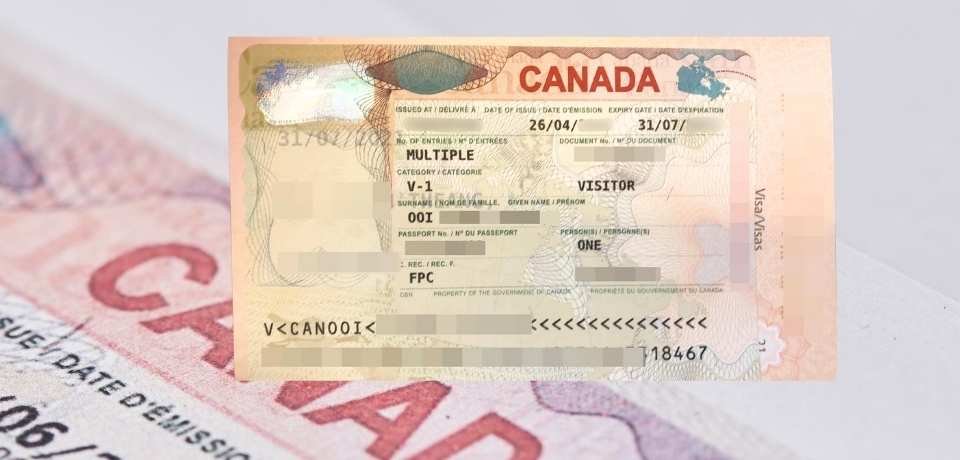Attending a conference in Canada can open doors to new opportunities and insights, but before you pack your bags, being aware of the visa requirements is very important. The question, “What visa do I need to attend a conference in Canada?” is frequently asked by international attendees eager to learn and network.
To attend a conference in Canada, most international visitors will require a Temporary Resident Visa (TRV) or an Electronic Travel Authorization (eTA), depending on their country of origin. These permits allow you to enter Canada for a short duration, making it easier to participate in events and engage with fellow professionals.
Dealing with visa processes can be difficult, but necessary for a smooth experience. Join us as we explore the details and steps to secure the right visa for your upcoming conference in Canada.
Do You Need a Visa to Attend a Conference in Canada?
The process of attending a conference in Canada often requires advanced preparation, including determining whether you need a visa. This depends on your nationality and the nature of your travel. Ensure you have the necessary documentation to meet entry requirements.

Prepare by gathering essential documents such as your passport, a formal invitation to the conference, proof of financial support, and a travel itinerary. Submitting these items on time will help facilitate your application process and avoid unnecessary delays.
If you plan to attend an international conference in Canada, check the entry requirements specific to your country. Research the official Canadian immigration guidelines to confirm what’s needed, ensuring a smooth travel experience. Planning will make it easier to focus on the conference itself without any travel-related hurdles.
What Visa Do I Need to Attend a Conference in Canada?
When it comes to attending a conference in Canada, knowing the right visa to apply for is essential. The visa you need depends on your nationality and the nature of your visit. Here’s a detailed breakdown of the types of visas you might need.

Visitor Visa (Temporary Resident Visa)
A Visitor Visa, also known as a Temporary Resident Visa (TRV), is required for citizens of countries that do not have visa-exempt status. Here’s how to apply for a Visitor Visa:
- Check Eligibility: Ensure that you are required to obtain a Visitor Visa based on your nationality. You can verify your eligibility on the Government of Canada’s official website.
- Complete the Application Form: Download and fill out the application form for a Visitor Visa. Make sure all information is accurate and complete to avoid delays.
- Gather Required Documents: Collect necessary documents, including your passport, proof of funds, and an invitation letter from the conference organizer. These documents support your application.
- Pay the Application Fee: Pay the required visa application fee, which can vary depending on your nationality. Keep the receipt as proof of payment.
- Submit Your Application: You can submit your application online or at a Canadian visa application center (VAC). Follow the instructions provided for your specific method of application.
- Attend an Interview (if required): In some cases, you may be asked to attend an interview at your local Canadian consulate. Be prepared to discuss your reasons for traveling.
- Wait for Processing: Processing times for Visitor Visas can vary, so apply well in advance of your travel date. Monitor your application status online if you applied electronically.
Electronic Travel Authorization (eTA)
If you are from a visa-exempt country and plan to arrive in Canada by air, you will need an Electronic Travel Authorization (eTA). Here’s how to obtain an eTA:
- Determine Your Eligibility: Check if your country is visa-exempt and eligible for an eTA. Most travelers from European and some Asian countries qualify for this option.
- Apply Online: Visit the official Government of Canada website to apply for an eTA online. The application form is very simple and requires basic personal information.
- Pay the Processing Fee: There is a small fee associated with applying for an eTA. Make sure to complete the payment to proceed with your application.
- Receive Confirmation: Most eTA applications are approved within minutes. However, some may take longer, so check your email for confirmation.
- Link to Your Passport: Once approved, your eTA is electronically linked to your passport. You do not need to print it out but carry your passport when traveling.
Business Visa
If you are attending a conference as part of business activities, you may need a Business Visa. This is often applicable for longer stays or specific business engagements. Here’s how to apply for a Business Visa:
- Understand the Requirements: Verify if your activities at the conference require a Business Visa. Consult the Government of Canada’s guidelines for specific details.
- Complete the Application Form: Fill out the Business Visa application form accurately, making sure to provide all necessary information.
- Prepare Supporting Documents: Collect supporting documents such as your business registration, invitation letter from the conference, and proof of funds. The Canada conference visa application process involves gathering all these essential documents.
- Submit Your Application: Submit the application either online or through a Canadian visa application center. Ensure you follow the submission guidelines carefully.
- Processing Time: Allow sufficient time for processing, as Business Visas may take longer than Visitor Visas or eTAs.
Check Specific Conference Requirements
Some conferences may have specific requirements or recommendations for visa applications. Always check with the conference organizers regarding any additional documentation or visa requirements related to the event.
Determining what visa you need to attend a conference in Canada is crucial for a successful trip. Depending on your nationality, you may require a Visitor Visa, an Electronic Travel Authorization (eTA), or a Business Visa. By following the application process for the relevant visa, you can ensure a smooth entry into Canada for your conference experience.
How to Apply for a Canadian Visa for Conference Attendance
Applying for a Canadian visa to attend a conference requires careful preparation and attention to detail.
Below are the steps you need to follow to ensure a successful application:
Step 1: Determine Your Visa Type
Identify whether you need a Visitor Visa, an eTA, or a Business Visa. Your nationality and the purpose of your visit will determine the appropriate visa type.
Step 2: Complete the Application Form
Download the relevant application form from the official Government of Canada website. Ensure that you fill it out completely and accurately to avoid delays.
Step 3: Gather Required Documents
Collect all necessary documents based on your visa type. Common requirements include:
- A valid passport
- Proof of funds to support your stay
- An invitation letter from the conference organizer
- Travel itinerary or flight details
Step 4: Pay the Application Fee
Check the fee for your specific visa type on the official website. Make the payment and keep the receipt as proof. Some visas may require additional fees for processing.
Step 5: Submit Your Application
Decide whether to apply online or in person at a Canadian visa application center (VAC). Follow the specific instructions for your chosen method of application.
Step 6: Biometric Information
Depending on your nationality, you may need to provide biometric information (fingerprints and photos). This is typically required for Visitor Visa applicants.
Step 7: Attend an Interview (If Required)
Some applicants may be asked to attend an interview at their local Canadian consulate. Prepare to answer questions about your travel plans and purpose of visit.
Step 8: Track Your Application
After submission, you can track your application status online if you applied electronically. Processing times can vary, so check the website for updates.
Step 9: Receive Your Visa
Once your application is approved, you will receive your visa. Review all details carefully to ensure everything is correct.
Step 10: Prepare for Your Trip
Once you have your visa, begin planning your trip. Confirm your travel arrangements and review any additional requirements for entering Canada.
By following these steps, you can successfully apply for a Canadian visa to attend a conference. Ensure that you start the application process early to allow for processing time and any potential issues.
Documents Required for a Conference Visa to Canada
When applying for a conference visa to Canada, certain documents are essential to support your application. Here is a detailed list of required documents based on the type of visa you are applying for:

- Valid Passport: Your passport must be valid for at least six months beyond your intended date of entry into Canada. It should also have blank pages for visa stamps.
- Completed Application Form: Depending on the requirements for a Canada Conference Visa and your visa type, you must accurately fill out the appropriate application form. This includes providing personal details, travel plans, and the purpose of your visit.
- Invitation Letter: An invitation letter from the conference organizer is crucial. This letter should detail your participation in the conference and confirm your registration.
- Proof of Financial Means: Provide evidence that you can financially support yourself during your stay in Canada. This can include bank statements, pay stubs, or a sponsorship letter.
- Travel Itinerary: Include a travel itinerary that outlines your travel plans, including flight reservations and accommodation details. Even if you haven’t finalized your bookings, showing proof of arrangements can be helpful.
- Recent Passport-Sized Photographs: Attach passport-sized photos that meet Canadian visa requirements. Ensure they are recent and follow the specified guidelines regarding size and background.
- Proof of Employment or Educational Status: This can be a letter from your employer or educational institution confirming your position or status. It helps establish your ties to your home country.
- Visa Fee Payment Receipt: Include the receipt for your visa application fee as proof of payment. Ensure that you retain a copy for your records.
- Additional Supporting Documents: Depending on your circumstances, additional documents may be required. This can include:
- A detailed cover letter explaining the purpose of your visit
- Travel insurance that covers medical expenses during your stay
- Proof of ties to your home country, such as property ownership or family connections
- Biometric Data (If Applicable): If required, be prepared to provide biometric data, including fingerprints and photographs. This may involve attending an appointment at a visa application center.
Ensuring that you gather all these documents before applying will help streamline the application process and reduce the likelihood of delays. Check the official Government of Canada website for any updates or specific requirements related to your nationality.
Processing Times and Fees for a Canadian Conference Visa
Having a clear idea of the processing times and fees associated with a Canadian conference visa is essential for planning your trip. Here is an overview of what you can expect:
Processing Times
Processing times for Canadian conference visas can vary depending on your nationality and the specific visa type. Generally, Visitor Visas may take anywhere from a few weeks to several months to process.
The official Government of Canada website provides estimated processing times for each visa category. Be sure to check these times when planning your application.
Factors Affecting Processing Times
Several factors can impact processing times, including:
- Volume of applications being processed at the time
- Completeness of your application and supporting documents
- Whether you need to provide biometric data or attend an interview
Visa Application Fees
Visa application fees can vary based on your nationality and the type of visa you are applying for. Typically, the fee for a Visitor Visa is around CAD 100.
If you are applying for an eTA, the fee is generally CAD 7. Keep in mind that these fees are subject to change, so check the official website for the most up-to-date information.
Additional Costs
In addition to the application fee, consider other potential costs, such as:
- Travel insurance for the duration of your stay
- Costs for obtaining supporting documents (e.g., passport photos)
- Expenses related to travel and accommodation while in Canada
Payment Methods
Fees can usually be paid online through the Government of Canada’s visa application portal or at a visa application center. Ensure that you keep a receipt for your records.
Knowing the processing times and fees associated with your Canadian conference visa will help you plan your trip effectively. By preparing in advance, you can avoid potential issues and enjoy a smooth entry into Canada.
Tips for a Successful Canadian Conference Visa Application
Applying for a Canadian conference visa can be very easy if you follow certain tips and best practices. Here are some essential strategies to enhance your chances of a successful application:

Apply Early
Start your visa application process as early as possible. This allows ample time for processing and any unexpected delays. Aim to submit your application at least several weeks before the conference.
Double-Check Your Application
Review your application thoroughly before submission. Ensure that all information is accurate and complete. Mistakes or missing information can lead to delays or denials.
Provide Complete Documentation
Gather and submit all required documents with your application. Missing documents can hinder the processing of your visa. Check the official guidelines to ensure you include everything needed.
Write a Strong Cover Letter
If required, include a well-crafted cover letter with your application. Explain the purpose of your visit and provide details about the conference. A strong letter can support your case.
Demonstrate Ties to Your Home Country
Provide evidence of your ties to your home country, such as employment, family, or property. This can reassure visa officers that you intend to return after the conference.
Stay Organized
Keep all your application materials organized in one place. This makes it easier to access documents during the application process. Staying organized can reduce stress and save time.
Seek Professional Help If Needed
If you feel uncertain about the application process, consider seeking assistance from an immigration consultant or lawyer. They can provide guidance and help ensure your application is complete.
Be Honest
Provide truthful and accurate information throughout your application. Honesty is essential in building trust with immigration officials. Misrepresentation can lead to serious consequences.
Prepare for Interviews (If Required)
If an interview is required, prepare by reviewing your application and anticipating possible questions. Be calm and confident during the interview. Providing clear and concise answers will help convey your purpose.
Follow Up on Your Application
After submitting your application, you can track its status online if you applied electronically. Following up can keep you informed and help alleviate any concerns about processing delays.
By following these tips for a successful Canadian conference visa application, you can increase your chances of approval. Careful preparation and attention to detail will help ensure a smooth and successful application process.
How Will You Deal With a Denied Canadian Conference Visa?
Receiving a visa denial can be disappointing, but it is essential to think about your options and what to do next. Here’s what you should know if your Canadian conference visa is denied:
Review the Denial Letter
When your visa application is denied, you will receive a letter explaining the reasons for the denial. Take the time to read this letter carefully to gain insight into the specific issues that led to the decision.
Common Reasons for Denial
There are several common reasons why a visa application may be denied, including:
- Incomplete or inaccurate application information.
- Lack of supporting documents.
- Insufficient proof of funds.
- Concerns about your intention to return to your home country.
Assess Your Situation
Reflect on the reasons for the denial and assess your situation. Consider whether you can address the issues raised in the denial letter. This assessment will guide your next steps.
Reapply for the Visa
If you believe you can address the reasons for denial, you may reapply for the visa. Ensure that you have corrected any issues from your previous application and provide all required documentation.
Submit a New Application
When reapplying, submit a new application along with the necessary fees. Clearly state in your new application that you are addressing the previous denial. Providing additional supporting documents can strengthen your case.
Seek Professional Help
If you are unsure about how to proceed, consider seeking assistance from an immigration consultant or lawyer. They can provide guidance on the best approach and help ensure that your new application is complete.
Explore Alternative Options
If reapplying for the same visa is not an option, consider exploring alternative visas that may be available to you. Research other visa categories that align with your travel purpose.
Understand the Appeal Process
In some cases, you may have the option to appeal the visa decision. This process typically involves submitting a formal request for review. Be sure to understand the requirements and timelines for appeals.
By learning what happens if your Canadian conference visa is denied, you can deal with the situation effectively. Knowing your options and taking the right steps can lead to a successful outcome in subsequent applications.
Is It Possible to Extend Your Stay in Canada After Attending a Conference?
If you wish to extend your stay in Canada after attending a conference, there are specific steps you need to follow. Here’s how to go about it:
Determine Your Eligibility to Extend
Before applying for an extension, check your eligibility based on your current visa type. Most Visitor Visa holders can apply for an extension if they meet specific requirements.
Apply Before Your Current Status Expires
Submit your application for an extension before your current visa or status expires. This is crucial to maintain your legal status in Canada. Typically, you should apply at least 30 days before your visa expiration.
Complete the Application Form
Download and complete the application form for extending your stay as a visitor. Ensure that all information is accurate and complete to avoid delays.
Gather Supporting Documents
Collect the necessary documents to support your application. This may include:
- A valid passport
- Proof of sufficient funds to support your extended stay
- An explanation of why you wish to remain in Canada longer
Pay the Application Fee
Pay the required application fee for the extension. Keep the receipt as proof of payment, as you will need to include it with your application.
Submit Your Application
Submit your completed application and supporting documents either online or by mail. Ensure you follow the submission guidelines provided by the Government of Canada.
Wait for Processing
After submitting your application, wait for it to be processed. Processing times can vary, so it is essential to check the estimated time frames on the official website.
By following these steps, you can extend your stay in Canada after attending a conference. It is important to be proactive and ensure you maintain legal status throughout the process.
Key Benefits of Securing a Visa for a Canadian Conference
Securing a visa to attend a conference in Canada offers numerous benefits. Here are some key advantages of obtaining a visa for your conference trip:

Access to Professional Development
Attending a conference provides opportunities for professional development. With a valid visa, you can engage in workshops, seminars, and discussions led by industry experts. This exposure helps develop your skills and knowledge.
Networking Opportunities
A visa allows you to meet fellow professionals, potential collaborators, and mentors. Building connections during the conference can lead to future partnerships and job opportunities. Networking is a vital aspect of career growth.
Gain Insights into Industry Trends
Conferences often showcase the latest trends and advancements in your field. By attending, you gain first-hand knowledge that can help you stay competitive in your profession. This information can also be shared with colleagues upon your return.
Cultural Exchange
Attending a conference in Canada allows for cultural exchange. You can interact with professionals from diverse backgrounds, enriching your perspective. This exposure promotes a better knowledge of global practices in your field.
Adding to Your Resume
Securing a visa to attend a prestigious conference adds value to your resume. It demonstrates your commitment to professional development and engagement in your industry. This can improve your appeal to future employers.
Personal Growth
Attending a conference can lead to personal growth. Engaging in new experiences, meeting diverse individuals, and expanding your knowledge can boost your confidence. These experiences can inspire and motivate you in your career.
Building a Professional Reputation
Actively participating in conferences helps build your professional reputation. Sharing your insights and knowledge positions you as an engaged and knowledgeable professional. This reputation can open doors for future opportunities.
Increased Job Opportunities
Networking and learning at a conference can lead to increased job opportunities. You may meet recruiters or hear about job openings through conversations. Having a valid visa facilitates your ability to explore these options.
By securing a visa for a Canadian conference, you open the door to numerous benefits. From professional development to networking opportunities, attending a conference can be a transformative experience for your career.
Frequently Asked Questions
We’ve compiled some commonly asked questions regarding attending a conference in Canada. If you have any questions, check the section, you may find your answer here.
Is the Application Process for a Canadian Visa Difficult?
While it can be detailed, many find the process manageable. Gathering necessary documents and being organized will help simplify your application.
Do I Need a Visa for Short Visits to Canada?
Whether you need a visa for short visits to Canada depends on your nationality. Citizens of visa-exempt countries may require an Electronic Travel Authorization (eTA) when arriving by air. Check the requirements for your specific country on the Government of Canada’s website.
How Long Does it Take to Process a Canadian Conference Visa?
Processing times for a Canadian conference visa can vary widely. Generally, it can take anywhere from a few weeks to several months. Check the Government of Canada’s website for current processing times related to your nationality and visa type.
Can I Extend My Stay in Canada After the Conference?
Yes, you can apply to extend your stay in Canada after the conference. You must submit an application before your current visa expires and meet specific eligibility requirements. Be sure to gather all necessary documentation and apply in advance.
Conclusion
As you prepare for an exciting conference in Canada, being aware of your visa requirements is essential for a smooth journey. Knowing “What visa do I need to attend a conference in Canada” can save you time and stress, allowing you to focus on networking and learning.
By securing the appropriate visa, you ensure hassle-free entry into Canada, enabling you to fully engage with fellow attendees and speakers. Remember, having the right documentation is key to maximizing your experience.
Don’t let visa confusion hold you back from seizing valuable opportunities. With the right information and preparation, you’ll be ready to make the most of your conference adventure in Canada.